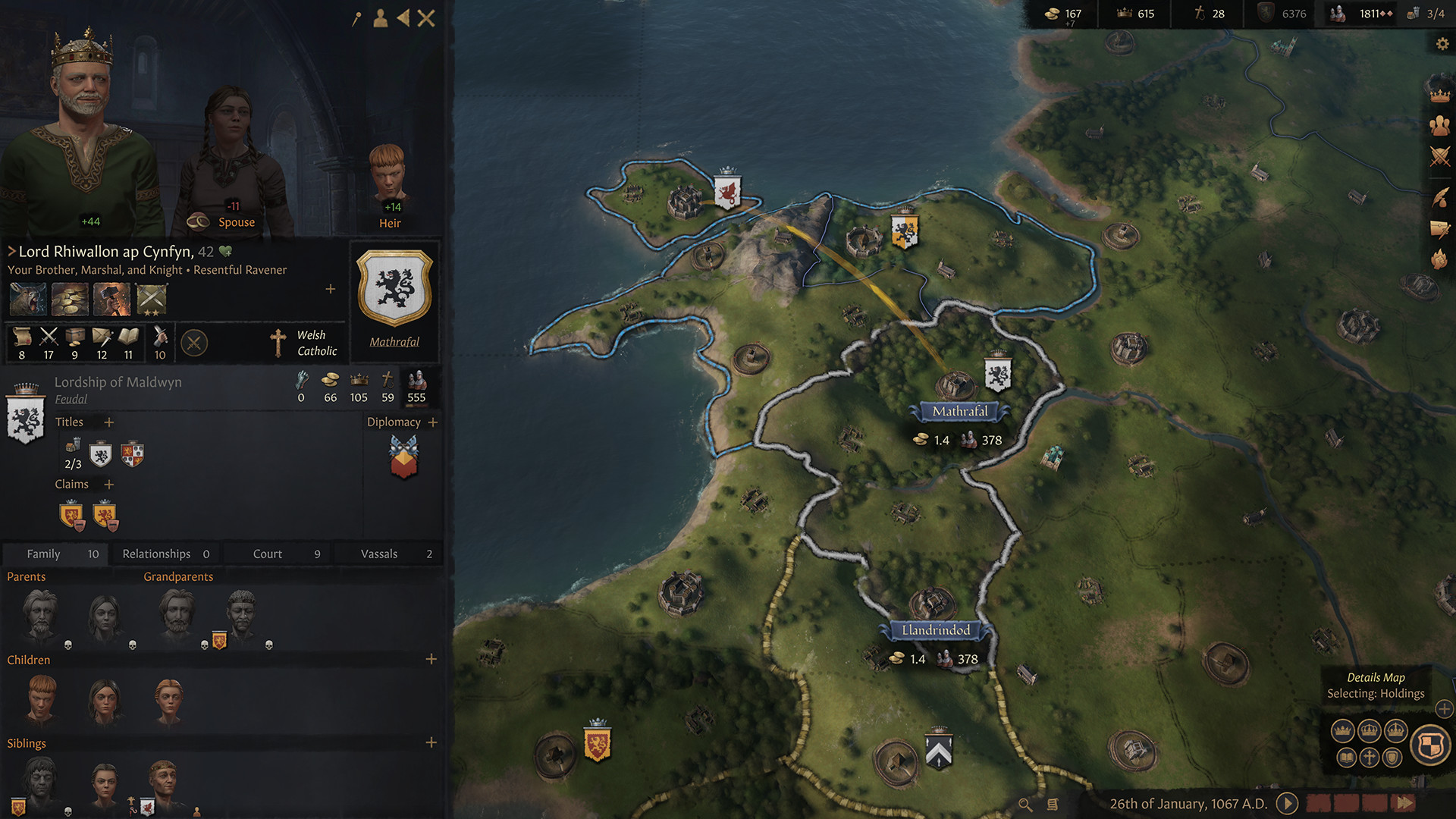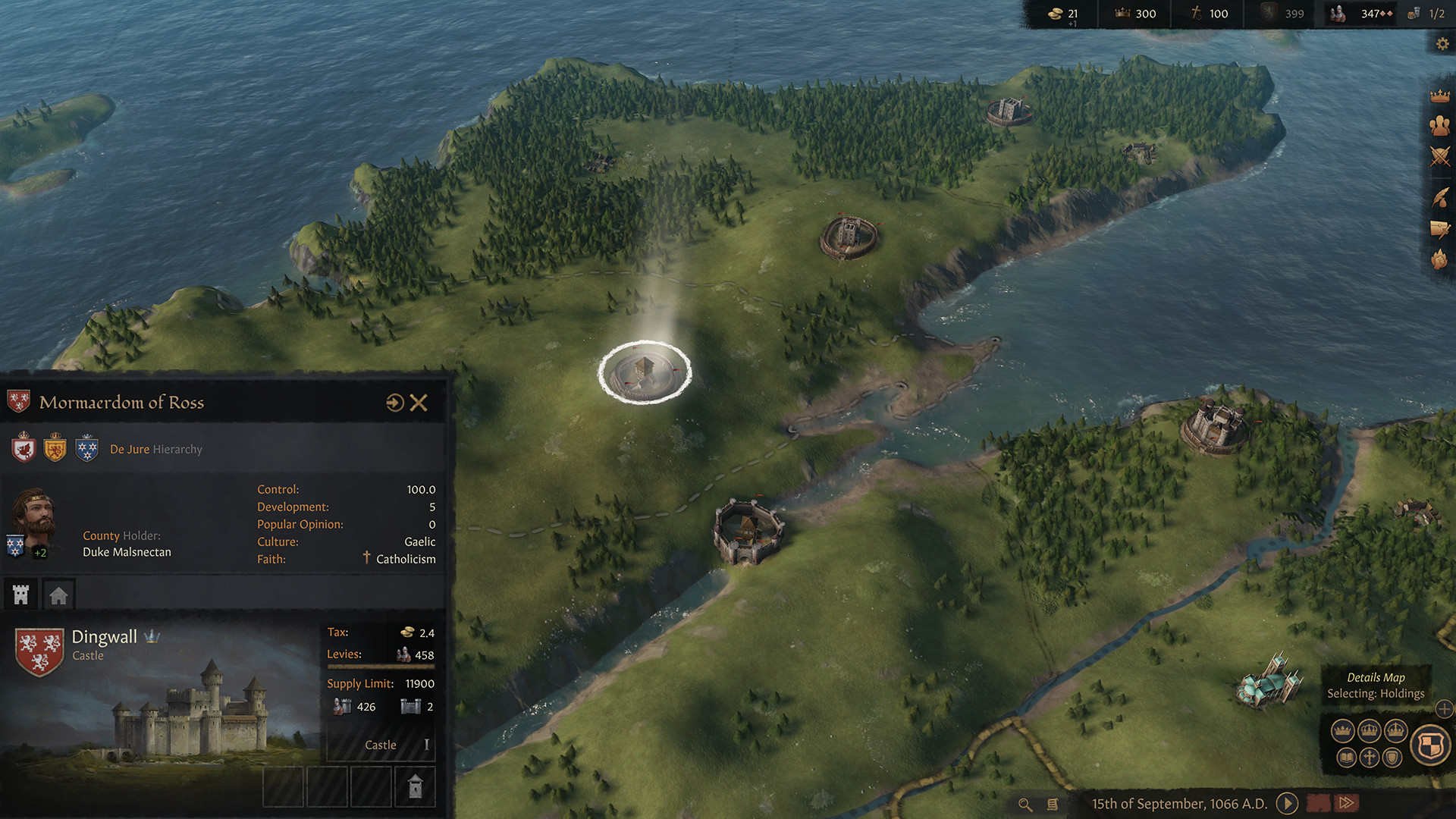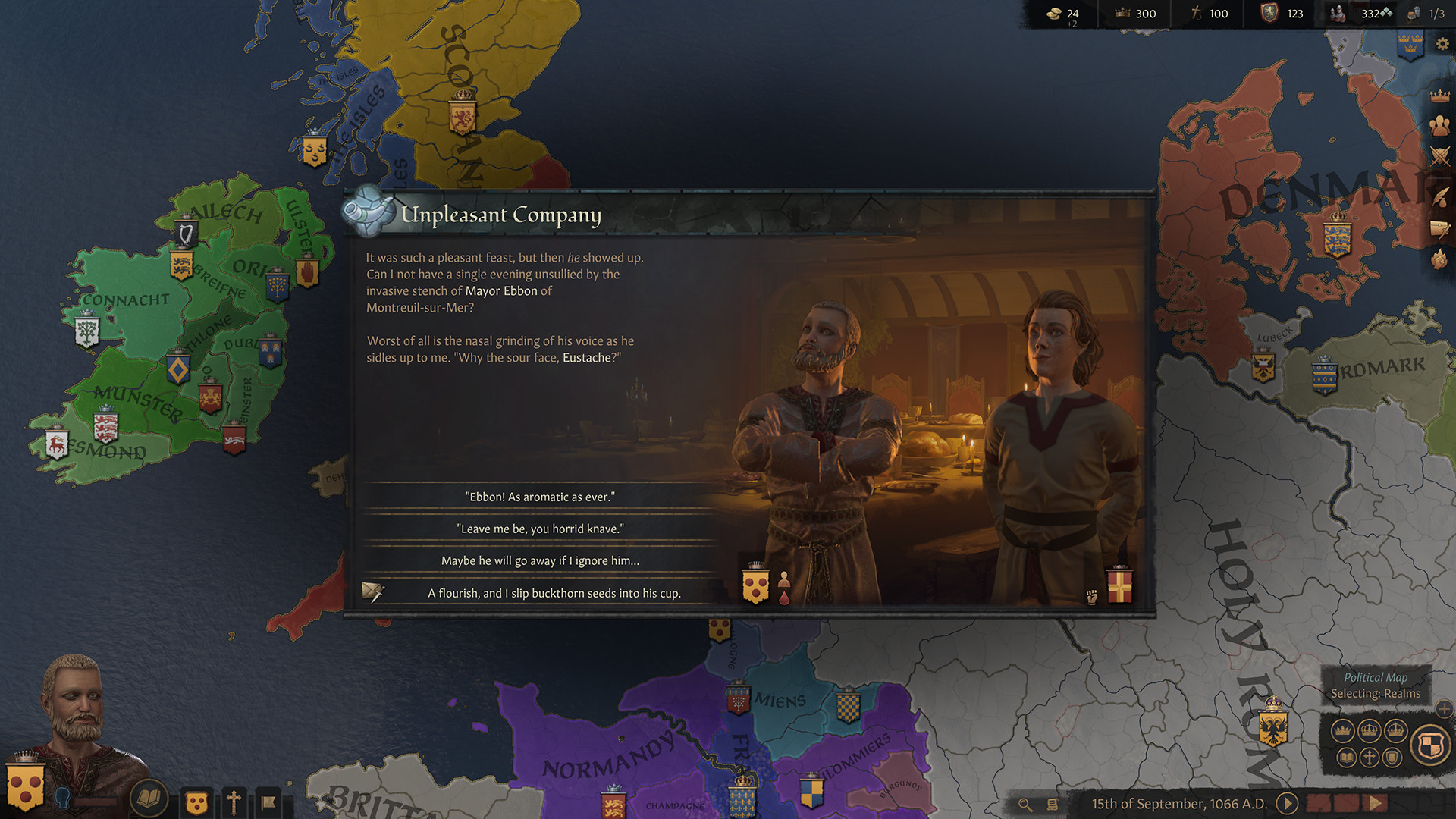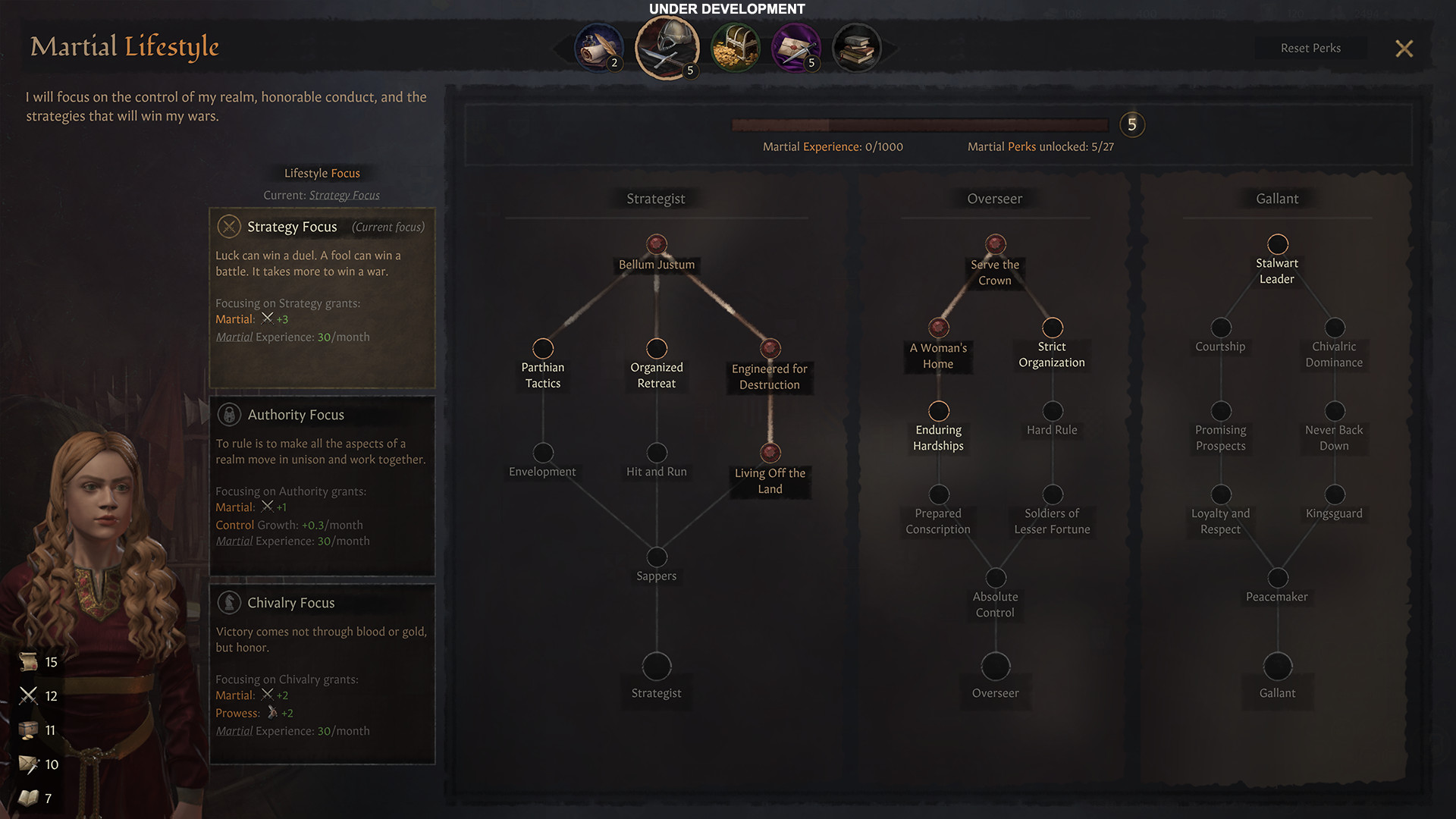Crusader Kings III is the newest generation of Paradox Development Studio’s beloved medieval role-playing grand strategy game. Expand and improve your realm, whether a mighty kingdom or modest county. Use marriage, diplomacy and war to increase your power and prestige in a meticulously detailed map that stretches from Spain to India, Scandinavia to Central Africa.
But uneasy lies the head that wears a crown! Your cunning is your greatest weapon, and intelligence is the key to all successful strategy. Guard your life and the future of your dynasty, because enemies foreign and domestic envy your status. Engage in espionage, join political factions, punish heretics or use assassins to make sure your throne passes safely to the next generation.
Crusader Kings III is the medieval strategy role-playing experience that you have been waiting for.
- Shape Your Dynasty: Guide unique characters through history, choosing lifestyles best suited to their personalities and your ambitions.
- Rewrite Medieval History: Dynasties will change and adapt to changes in family and politics, swimming in a rich world of religious faith and royal pageantry.
- Build a Mighty Kingdom: Use cold steel or warm words to expand your realm; war backed by cunning, and diplomacy that unites bloodlines.
- Experience High Drama: Stranger than fiction stories leap off the screen, as characters plot against you and events push you to extremes.
- Learn as You Go: Guided advice helps newcomers and veterans navigate a rich medieval world. In-game suggestions tip you off to paths you might not have considered.
- The Usual Crusader Kings Fun: Keep a stubborn council in line, scheme against your overbearing uncle or marry rich duchesses for their land and legacy.
Salutations!
Its been a while since I last wrote a DD, so a quick (re)introduction might be in order. Im Emil, aka Servancour, one of your resident CK3 game designers. Ive been on the project since way before release, and tend to mostly focus a lot on game mechanics and systemic features. Which, in fact, brings me to why Im here today. When we settled on Persia as the focus for our upcoming Flavor Pack, we soon came to realize that this would be an excellent opportunity to revisit the Clan Government and give it a much-needed update.
Discuss Dev Diary #137 on our forums!

Clans, as you currently know them, are very similar to Feudal. There are only two real points of difference between them. Opinion is a major factor in their obligations, meaning that a vassals opinion of their liege affects how much taxes and levies they will give to their liege. Secondly, they have access to and utilize vassal contracts, albeit in a slightly stripped-down version, with less available options than their Feudal counterparts.
This begs the question; How can we make Clan Government stand out? Weve already identified one aspect above, so our first action and problem to solve is this - How do (or should) Clans manage their vassals? Secondly, and perhaps much more important, is what does a Clan actually represent? What does the name mean for gameplay?
But Im getting ahead of myself. Lets start with the first question, shall we? And have a look at Clan obligations.
[hr][/hr]
Tax Jurisdictions and Tax Collectors
While we knew we wanted to add something new to Clan obligations, we had to ask ourselves how we wanted to make it different. As with all things Crusader Kings, adding a new element that makes use of characters felt like a natural fit, to give obligations some personality if you will. Meet the Tax Collector.

Youll have access to a limited number of Tax Jurisdictions. To which you assign your Clan vassals as Taxpayers, allowing you to gain both taxes and levies from your subjects. A Jurisdiction requires a Tax Collector to function, however. So, before you can collect any taxes, you need to appoint one of your courtiers as a Tax Collector for each Jurisdiction.

With Tax Collectors, you wont manage the obligations of your vassals directly. Instead, you manage them through your Tax Collector. Similar to a Court Position, a Tax Collector uses their aptitude to set the obligations of the vassals assigned to them. Higher levels of aptitude means that youll get more taxes and levies. Aptitude is primarily based on their skills, with Learning being the more important one, but their opinion of you also plays a significant part. To maximize the use of your Tax Collectors, youll want to find and appoint a skilled character, and then put the sway scheme to good use in order to squeeze as much gold from your subjects as possible.

While your Tax Collectors act as your intermediaries, you are still able to exact a certain degree of control of how they should manage your vassals. This is where Tax Decrees come into play. A Tax Decree is essentially how you want your vassals to be taxed, changing the obligations and providing an assortment of additional benefits.

With the introduction of Tax Decrees, it made perfect sense to move over some aspects of vassal contracts to this new system instead. For example, this is where youll find Iqta, Ghazi, and Jizya to use as you see fit. While you wont have to bother with decrees if you dont want to, they do give you opportunities to min-max in different ways. Decrees change the obligations of your vassals, either increasing or reducing them, in exchange for other boons. Take Iqta as an example. Iqta is a great option if you find yourself with vassals who are slightly upset, just enough for you to start taking notice, and if you also find yourself being at war frequently, as Iqta provides you with increased Men-at-Arms Damage based on the number of assigned vassals alongside an opinion bonus.

One thing to consider is that the modifiers applied to the obligations occur on the level as set by your Tax Collector. Which makes Decrees more or less powerful depending on the Tax Collector in question. Again, looking at the effects of Iqta, -20% to both taxes and levies wont be very noticeable if your Tax Collector has a terrible aptitude. This makes Iqta very rewarding for the price you pay, since the gained benefit is pretty good. If your Tax Collector is excellent on the other hand, youll feel the impact of those 20%.
That about sums it up for how Tax Jurisdictions, Collectors, and Decrees work. With obligations out of the way, lets go back and answer our second question!
[hr][/hr]
House Unity
As the name suggests, Clans should be all about the clan itself and its members. Something that we really dont represent at the moment. Nor does it have any real impact on how you play the game. To solve this and put a significantly larger emphasis on your House when you are playing as a Clan, we are introducing House Unity.
Unity represents the overall state of a House. Essentially the internal relationships between its members and the attitude they have towards each other. In many ways, Unity is the result of how you choose to interact with your fellow House members. We show everything regarding Unity in each Clans House view, allowing you to easily inspect your own Unity, and the Unity of other Houses.

We measure Unity on a scale between 0 and 200, divided up into five distinct ranges, or levels. Each level comes with a set of impactful rules and tradeoffs that may have a noticeable impact on how you play the game. By default, most Houses start in the middle. Essentially a neutral level. From there, theyll be able to actively increase or decrease their Unity.
The levels are as following, listed from lowest to highest level of Unity:
- Antagonistic
- Competitive
- Impassive
- Friendly
- Harmonious
Thematically, having a high level of Unity means that youll enjoy internal stability and have House members that (generally speaking) adopt a friendly attitude towards each other. But youll pay for it with a reduced capability to wage wars as efficiently. CBs become more expensive to use, and you can no longer use the Invasion CB. A low level of Unity provides you with the opposite. Youll gain a great deal of military might, allowing you to more easily conquer large swathes of land, but pay the price of reduced internal stability. Depending on your playstyle, you might enjoy a particular direction more than the other. Regardless of your own preference, having either low or high levels of Unity is meant to be equally viable.
Instead of having me ramble about the effects of each level, here are some nifty screenshots showing you what they look like:





Other than the passive effects, you also gain access to a set of unique decisions. Most of which are available only to the House Head, as they provide powerful boons for the entirety of a House. The primary currency for these decisions is Piety. Since most Clans belong to an Islamic faith, this felt like a natural fit. Besides, Piety is generally more difficult to get than Prestige, making you consider where and how to spend that hard earned Piety.
Some of these decisions make use of a completely new type of modifier; a modifier that scales on the number of landed House members. If you are like me, and like to utilize nepotism to the fullest, these modifiers can become incredibly powerful. Be mindful that the Piety cost will increase accordingly.
For all you modders out there, you can use scaling modifiers in every place you use regular modifiers. You simply feed it a value for how you want it to scale.
Lets look at an example. If your House is Antagonistic, you can use the decision Reinforce Army with Loyal Officers:


Last, but certainly not least, Unity directly affects the outcome of your succession. Each level has an impact on the outcome of how titles are inherited, and the succession changes automatically as your Houses Unity changes. They all maintain a variant of Partition, meaning that titles will always be split to some extent. When you are Antagonistic, all eligible children inherit equal shares. If you are Harmonious, the primary heir inherits the majority of the titles (at least two thirds). With varying degrees in-between. At worst, this means that you dont have to deal with Confederate Partition, and at best, you have an easier time accessing a superior version of High Partition. The drawback? While you can try to get a single heir succession law, such as Primogeniture, it will be more difficult and expensive to do so.

Now that we know what Unity does, lets explore how its impacted by gameplay. As mentioned previously, Unity is all about the members of a House and how they interact. This will become apparent as you start interacting with your family members. A lot of existing interactions have been updated to also have an impact on your Unity in different ways. Whenever you are playing as Clan that is. Taking what we call divisive actions, such as Revoke Title or Imprison, against fellow House members will naturally reduce your Houses Unity. Meanwhile, unifying actions, such as Negotiate Alliance or Offer Ward, will increase Unity. Unity is therefore really a byproduct of how you and your fellow House members interact with each other.
With that said, the House Head enjoys a number of additional actions, giving them a greater degree of control in how they want to direct the Unity of their own House. The foremost of these is a decision in which the Head actively takes a stance and chooses a direction to steer their Unity. Then we also have two new interactions the Head can use on members of their House, both of which act as a double-edged sword and have some clear advantages and drawbacks.



There are of course many more interactions, far too many to list all of them here, which will have an impact on your Unity. Worth mentioning is that the immediate impact of these interactions is fairly small, but they stack up over time, especially when you are not the only one within your House who will be using them.
Rest assured that youll have plenty to explore as you get your hands on the updated Clan Government later this year, which will be included with the free update launching alongside Legacy of Persia!
[hr][/hr]
Join the struggle for medieval dominance in Legacy of Persia, the new Flavor Pack for Crusader Kings III, releasing on November 9.
https://store.steampowered.com/app/2313540/Crusader_Kings_III_Legacy_of_Persia/
[code]Join the conversation and connect with other Paradox fans on our social media channels!Official Forums Official Discord Steam Discussions Twitter Facebook Instagram Youtube [/code]
Minimum Setup
- OS: TBC
- Processor: TBC
- Graphics: TBC
Recommended Setup
- OS: TBC
- Processor: TBC
- Graphics: TBC
[ 6305 ]
[ 5935 ]
[ 2477 ]
[ 4756 ]






































